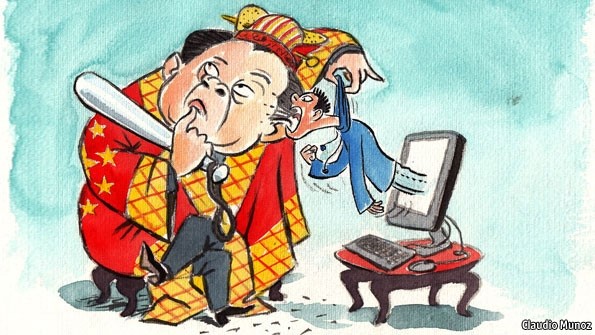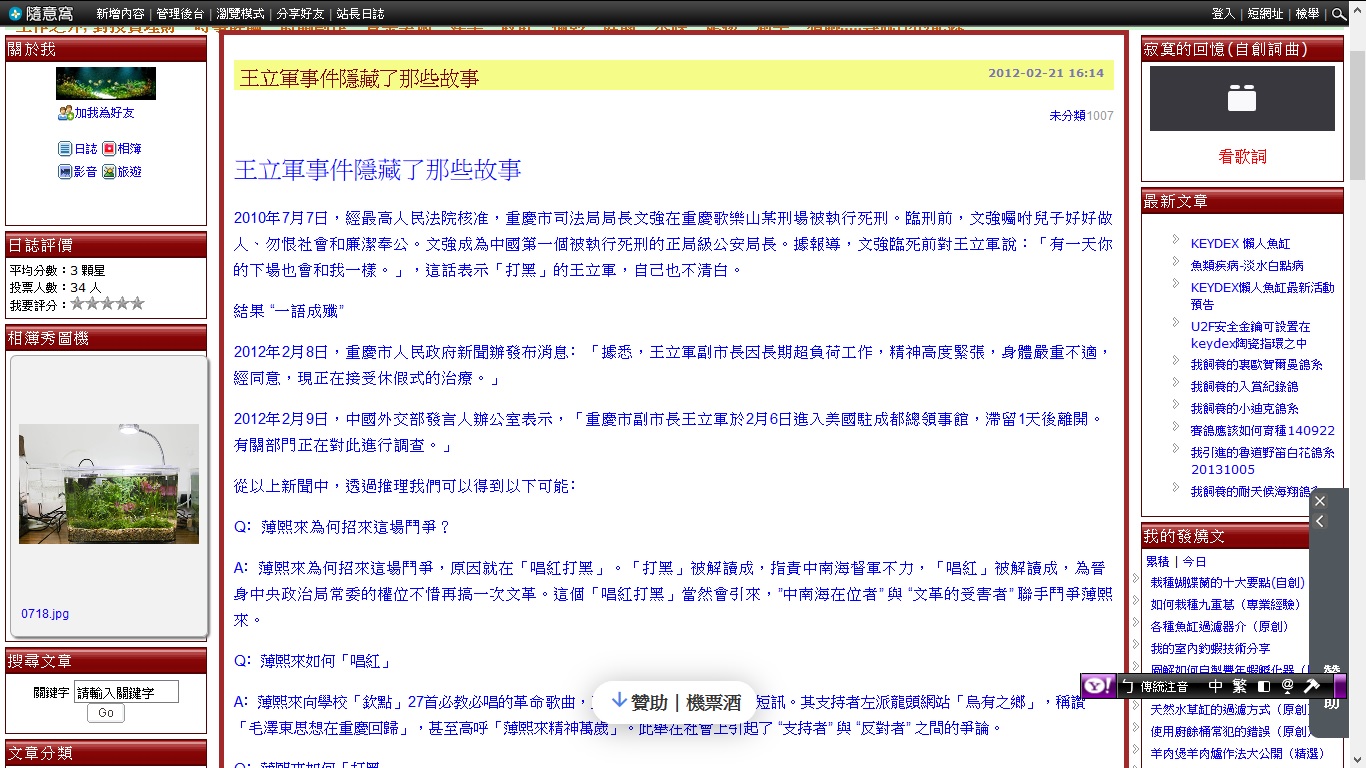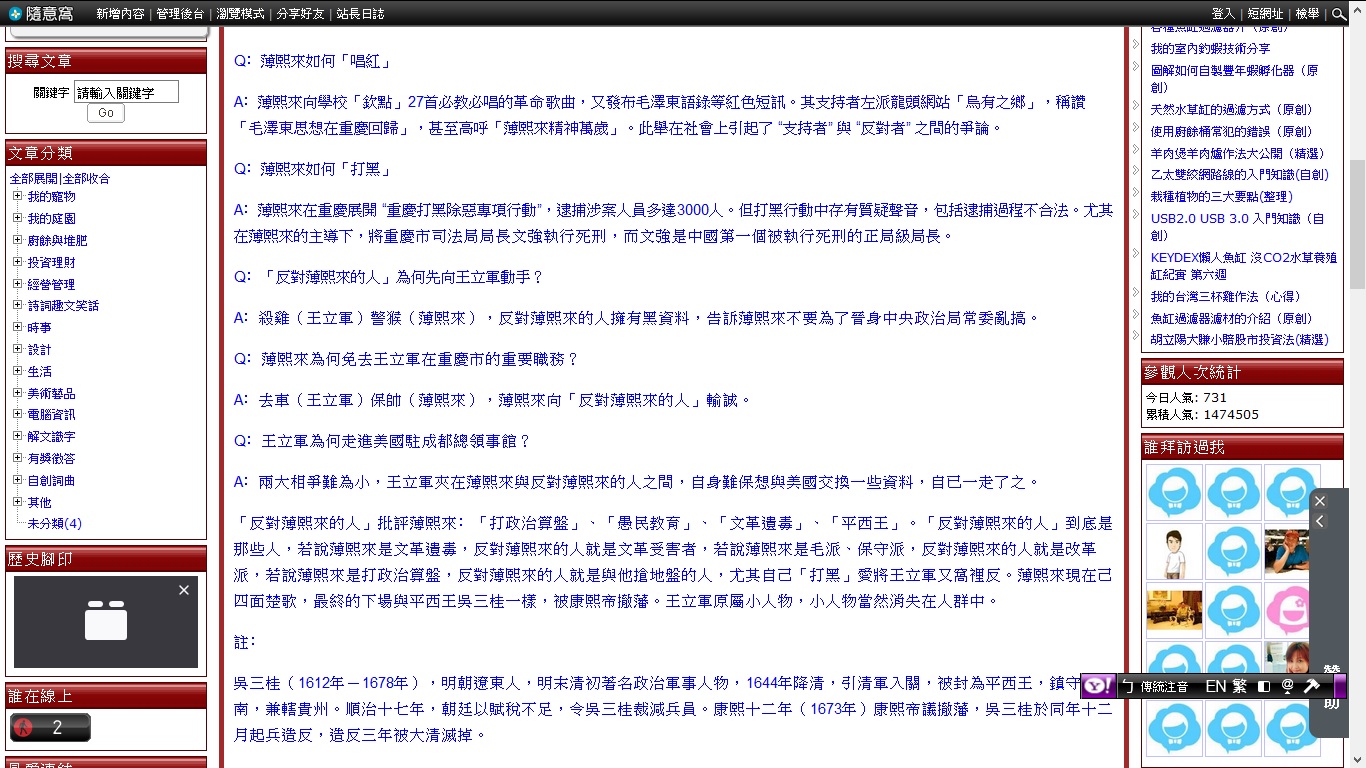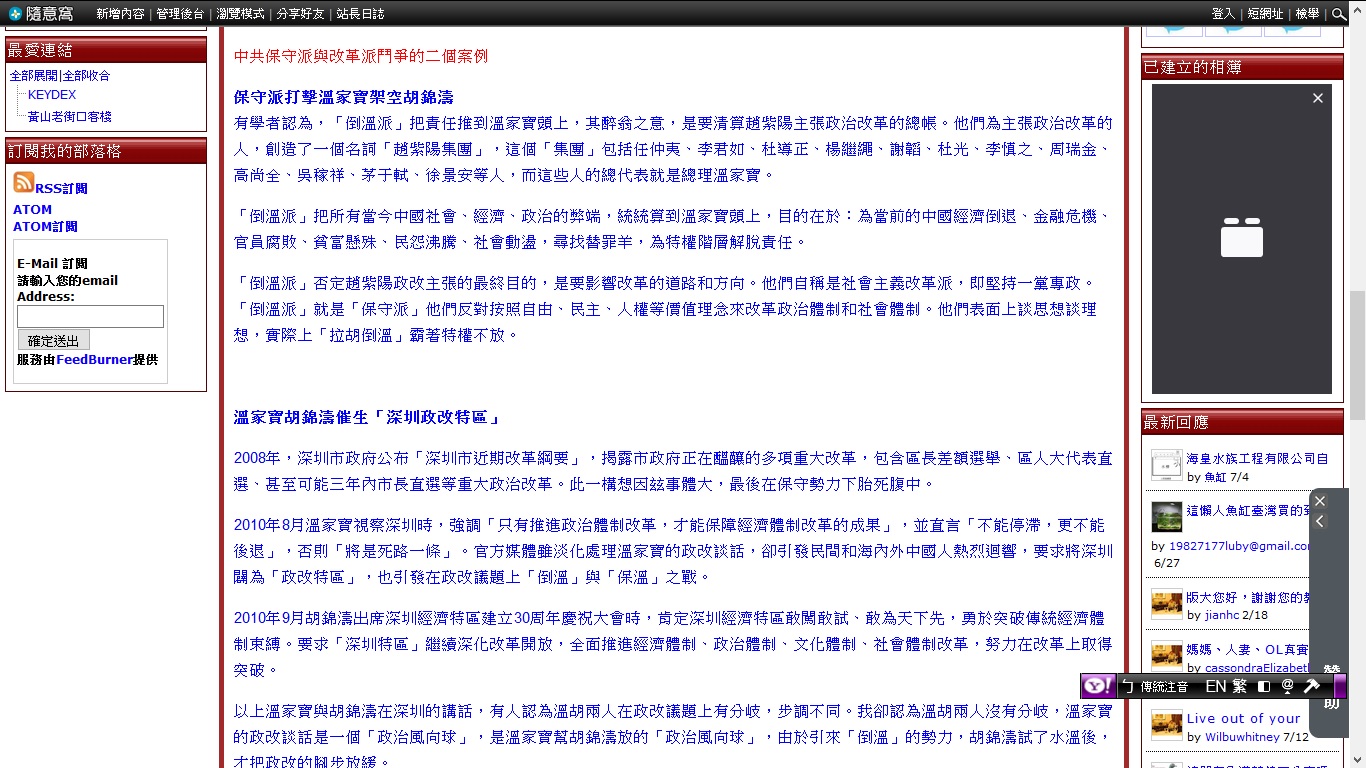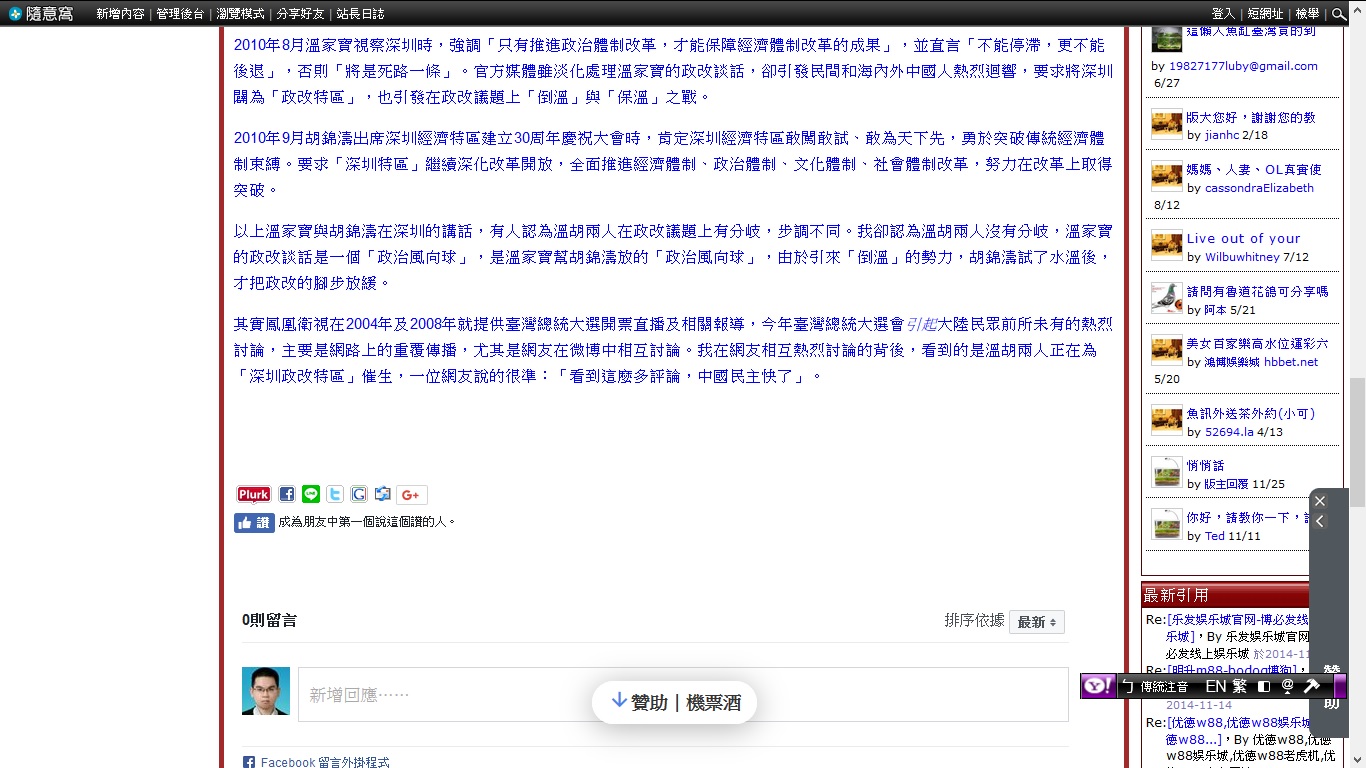

 字體:小 中 大
字體:小 中 大 |
|
|
|
| 2018/03/25 01:09:19瀏覽74|回應0|推薦0 | |
The power of microblogsZombie followers and fake re-tweetsThe state is responding to microblogs and the rumours they startMar 17th 2012 | BEIJING AND SHENYANG | from the print edition
IN THE year 15AD, during the short-lived Xin dynasty, a rumour spread that a yellow dragon, a symbol of the emperor, had inauspiciously crashed into a temple in the mountains of central China and died. Ten thousand people rushed to the site. The emperor Wang Mang, aggrieved by such seditious gossip, ordered arrests and interrogations to quash the rumour, but never found the source. He was dethroned and killed eight years later, and Han-dynasty rule was restored. The next ruler, Emperor Guangwu, took a different approach, studying rumours as a barometer of public sentiment, according to a recent book “Rumours in the Han Dynasty” by Lu Zongli, a historian. Guangwu’s government compiled a “Rumours Report”, cataloguing people’s complaints about local officials, and making assessments that were passed to the emperor. The early Eastern Han dynasty became known for officials who were less corrupt and more attuned to the people. In this section · »Zombie followers and fake re-tweets Related topics · China Modern China’s Communist Party rulers make use of both these methods in the era of microblogs, or weibo, the various Chinese equivalents of Twitter, which is blocked in China. It is hard to overestimate how much the arrival of weibohas changed the dynamic between rulers and ruled over the past two years. More than 250m Chinese internet users have taken to microblogs for many purposes, plenty of them purely recreational. But a popular pastime is to spread news and rumours, both true and false, that challenge the official script of government officials and state-propaganda organs. The authorities have responded in two main ways. One has been to increase their own use of weiboas a listening post, a strain of governance in the spirit of Emperor Guangwu; the other, more in the spirit of the dethroned Wang Mang, has been to combat rumours harshly and to tighten controls over the microblogs and their users, censoring posts and closely monitoring troublemakers. Officials are attempting to make these tasks more manageable by requiring that users of the most prominent microblog service, Sina Weibo, register using their real name and identity-card number by March 16th. The other leading microblog, called Tencent Weibo, now also requires new users to register with their real name. Microbloggers can continue using nicknames as their online identities, as long as the weiboproviders have their real-world identities on file. It is unclear how much the real-name requirement will affect what microbloggers say. Indeed, it remains unclear how strictly it will be enforced, considering the booming market that already exists in microblog-related trickery. For mere pennies you can buy followers for your weibo account to make you look more popular (known as “zombie followers” because they mindlessly follow others). You can also purchase re-tweets and even comments on your posts. Inevitably amid all this enterprise, some companies say that for a fee (of around $80), they can provide official verification for weiboaccounts, apparently allowing customers to register under fake identities (the microblogs verify legitimate users for nothing). No matter how it is enforced, user verification seems unlikely to deter the spread of rumours and information that has so concerned authorities. Aware that they cannot ignore this new outlet for public opinion, officials have moved to engage with it: government agencies, party organs and individual officials have set up more than 50,000 weiboaccounts, according to the Chinese Academy of Governance. This degree of online engagement can be awkward for authorities used to a comfortable buffer from public opinion. When Wang Lijun, the former police chief of the region of Chongqing, sought shelter at an American consulate last month, the story broke fast on microblogs. Responding to the online frenzy, a Chongqing government weiboaccount claimed that Mr Wang was on medical leave receiving “vacation-style treatment”, a comically implausible euphemism that immediately went viral. The news on March 15th that Mr Wang’s erstwhile patron, Bo Xilai, had been sacked as party secretary of Chongqing marked the first time a high-level purge has been commented on in real time by microbloggers. Authorities keep a close eye on online troublemakers, but rely on internet companies to fence and supervise their own playgrounds. The big microblogs employ hundreds of monitors to remove content they know will be unacceptable to the authorities. Yet the task of quashing rumours is a Sisyphean one. Rumours can run especially rampant in China because, even as citizens now have more social space in which to live, the country lacks sufficiently reliable institutions, such as an independent press and judiciary, to play the role of referee. It is left to officials and the state media to implore netizens to be responsible. Who you gonna call ? In this task, officialdom has some allies. One is Dianzizheng, the online alias of a 43-year-old rumour-hunter. An employee of a state media outlet by day, at night he tries to debunk viral falsehoods using a Dell computer in his apartment in Shenyang, in China’s north-east. He spoke to The Economiston the condition that his real name and his employer were not identified. Among the rumours Dianzizheng claims to have played a part in refuting are a story that organ harvesters were targeting subway stations for victims, and that 10,000 people had beaten up policemen in the southern province of Fujian. He also tries to track down the sources of rumours, though with little success. His enemies have at their disposal armies of zombie followers and fake re-tweets as well as marketing companies, which help draw attention to rumours until they are spread by a respected user with many real followers, such as a celebrity. Dianzizheng says real-name registration should help him and his fellow rumour-hunters, but accepts that it is unlikely to be decisive. “We have a saying among us: you only need to move your lips to start a rumour, but you need to run until your legs are broken to refute one,” he says, in a tone that is cheerful and tireless. He is motivated, he says, by the national interest. “I believe there is a huge risk to the country if rumours go unchecked.” Perhaps so. Mr Lu, the historian, argues that the problem faced by the emperor Wang Mang in hunting down rumours 2,000 years ago was not the rumours themselves, but the truth that they reflected: a nervous public. In the age of weibo, it may be that the wisps of truth prove more problematic for authorities than the clouds of falsehood. from the print edition | China · Recommended · 26 Zombie followers and fake re-tweets Mar 17th 2012, 18:15
About this article, the two contentious point is the followings which I would like to share with the Economist’s readers and authors. The first is that rumor, indeed, sometimes steers the transition of China’s central regime or dynasty; the second is the effect of Chinese blog and whether they can affect Chinese politics.
There were similar ideas in Taiwan’s modern history. If recalling the stories 25 years ago, choosing the successor of Taipei’s Chiang Ching-guo experienced the process of ying-yang logistics. The days before abandoning Chiang's martial law, people in Taiwan coouldn’t make any words feeling like rumor. The blur case of Lee Tung-hui was not wholly legal or rational. A saying from Japanese scholar Siba Ryotaro, a college’s classmate with Lee, called this weird Lee “The president in the mouth of tiger”, which was also a book’s title of Japanese writer Uesaka Fuyuko. Earlier than this book published, some rumors has it that Lee got the seat by means of somewhat grey mimic. And the murmur was everywhere in Taiwan for a while just after this book for sale, with few population of mobile phone’s user.
It is at this start that the disparity in politics occurred between Lee and Taiwan’s former primer Lien Chan. Moreover, some anecdotes flourished when Lee prepared for the 1996’s election, including ying-yang’s thoughts such as the origin of “tiger” sayings. In 1999-2000 and about the occurrence of Taiwan’s 921 earthquake, Chen Shui-bian was seen as the reincarnation of Han dynasty’s founder, Emperor Gau-zu Liu Bang. The saying appeal to some numbers of local supporters, including me. Though the above is almost forgotten seperately with authors’ passing away or jailed in the prison as zoo’s monkey looking like another one, the two “successful” stories has it both ways.
For more than a hundred year, the evolution of the way to deliver message to each other has been many time’s turn to the modern Internet, 3G, even 4G two years later in China. Roughly, it is estimated that the population of Weibo user reaches 0.25 billion in January. I also have a Weibo’s blog but lack of beef or vegetable, surfing some famous blog on this social network. From the top 10 blog (including my wife’s friend), they talk very much about their share including chat, loving affair, family’s tiny and huge or their routine for business. Well, some sentences contain the sarcastic comment on news’ public figures. The self-control of these from the website’s manager works constantly, but sayings is after all not other, espeically under Chinese culture. So, just for fun? There is somewhat truth among them, I think.
Recommended 2 Report Permalink *相關照片是轉自「王立軍事件隱藏了那些故事@ 脫序達人懶惰達人創新達人 from xuite網誌」http://blog.xuite.net/jack_ting/blog/57638496-%E7%8E%8B%E7%AB%8B%E8%BB%8D%E4%BA%8B%E4%BB%B6%E9%9A%B1%E8%97%8F%E4%BA%86%E9%82%A3%E4%BA%9B%E6%95%85%E4%BA%8B:原來在王立軍出事前,有去看過之前第一位的文強,有這麼一個徵兆曾經在黨內流傳。王的事件被習近平及王歧山拿來當反貪打虎的樣板,開始了至今有六年的重大政策實施。
網路謠言往往透過張隻嘴會很快達到效果,但如果作澄清,腳斷了也跟不上謠言速度。這在網路社群還剛萌芽時候就有了,發生在台灣。最顯著的例子就是台灣出版日本名作家司馬遼太郎「虎口下的總統」,其提到李登輝在蔣氏父子政權的不容易升遷和解嚴後的政治轉型過渡的能耐,並予以讚賞。其也透露了一些也許是算命的一種道理護著他的名聲。也有人加以附會一些小軼事,開始有人覺得這個李桑親綠,國民黨主席之權勢非其所願「於民於利」的途徑。在李登輝的老家三芝經淡水到台北市之間的竹圍附近,有一座虎頭山,就在現在他所創辦的台灣經濟綜合研究院旁,此山也許是一種倒影比喻李登輝的仕途有些險阻但不大(不高也不險),指以全民普選產生領導是一種順勢而為的舉動。果然澎恰恰帶著三立電視台灣台在兩千年台灣總統大選當在閻羅王廟裡擲筊,是五號的水蓮配唯一是聖筊,這是民主政治也受天理維持的明證。陳水扁就是兩千多年前的漢高祖劉邦轉世投胎而來的,若說其他人,連戰曾經是明朝最艱困的嘉靖皇帝而宋楚瑜不過是連鳥都稱不算是的小人物而已,所以這兩千年的選舉除了九二一大地震的餘波,真是不可思議的政黨輪替。 筆者在新浪微博有開一個帳號也是叫sharkroro,可是不好用,而且主要筆者這幾年是在經濟學人雜誌附近參與,看這網路消息晃一晃,說真的要認為會對政權或政策起多大影響力,是不太大的,就是鬧哄哄的玩著的看而已,而且最近習近平第二任後,加緊了一些言論過濾機制,這微博和Tencent騰訊的微博有能幹嘛嗎? *這幾句要刪掉「From the top 10 blog (including my wife’s friend),」 |
|
| ( 心情隨筆|心情日記 ) |



